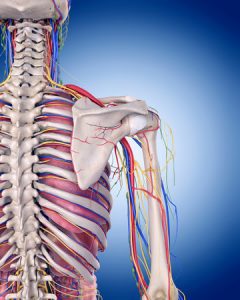Most of us know of someone who has suffered from “a pinched nerve,” a troubling and sometimes painful condition that is typically felt elsewhere in the body. What many may not realize is that a group of nerves, arteries and blood vessels can also be compromised at the same time, in the same general area. Thoracic Outlet Syndrome (TOS) is such an example. Considered an umbrella term, TOS covers several syndromes, which may include any number of medical conditions that tend to have similar signs and symptoms.
As we all know, every nerve, artery and vein is systematically placed within your body. Likewise, the spinal nerves extend down the spine, each to a specific location, before exiting and spreading out to the exact muscle(s) or organ(s) it innervates. Nerves and blood vessels are mostly unencumbered by other structures, though there are a few areas wherein a portion of each pass through relatively small areas called plexuses.
Thoracic outlet syndrome refers to those disorders that may occur when the brachial plexus becomes compromised. Consisting of the area beginning at the base of your neck, the brachial plexus continues down between your collarbone and first rib. The nerves found here are tasked with controlling muscle movement and sensations in your shoulder, arm and hand, which is where you would typically feel the symptom(s).
Causes, Symptoms & Prevention
Typically attributed to physical trauma, repetitive motion or repetitive injuries, TOS can also be caused by anatomical defects, pregnancy, and/or pressure on the joints from carrying a heavy purse or backpack on the shoulder(s). If left untreated, symptoms may become worse and permanent neurological damage could occur.
Talk to your doctor if you have any of the following:
- Pain, numbness, swelling or tingling in your shoulder, arm or fingers
- Muscle wasting in the fleshy base of your thumb
- Cold fingers, hands or arms
- Weakening grip and/or fatigue of the arm or neck
- Hands or fingers appear bluish or colorless
- Throbbing lump near your collarbone
If you think TOS could be affecting your life, talk to your doctor. He/she will likely suggest that you avoid carrying heavy bags on your shoulder and get some form of therapy. Medication or invasive surgery should always be a last resort.
Therapeutic massage can help create more space within the plexus by relaxing affected muscles, calming the nervous system and improving circulation. Call today to schedule your next massage!
About the Author:

Libby Winterhalter, licensed massage therapist (LMT), has been in private practice since July 2004. She graduated from SHI Integrative Medical Massage School, then located in Lebanon, Ohio. Prior to that, she received a Bachelor of Art’s degree in Communications along with a minor in Religious Studies from the College of Mount St. Joseph in 2001. Libby has also worked both in the corporate world and she served as a Journalist for the United States Navy for 22 years, from which she is now retired. She is an active member of the American Bodyworkers and Massage Professionals Association (ABMP).
Libby naturally blends both medical-based treatments and holistic therapies offering a more effective and comprehensive experience. Each session is specifically tailored to that client using one or more of the following techniques: therapeutic massage, Swedish (relaxation) massage, sports massage, Active Isolated Stretching – considered to be both a neuromuscular and myofascial release technique – Trigger Point Therapy, Craniosacral Therapy and more.
Libby has worked extensively with clients dealing with chronic pain, strains and sprains, compromised joints, spinal fusion(s), temporomandibular disorder, scar tissue, migraines, whiplash, digestive issues, plantar fasciitis and other foot-related pain, carpal tunnel syndrome, post-traumatic stress disorder, failure-to-thrive syndrome, pregnancy, cancers, amyotrophic lateral sclerosis (ALS, or Lou Gehrig’s Disease), sports-related injuries and severe injuries resulting from other accidents.
Thankfully, not all of Libby’s clients are facing life-altering issues. One client tells her she keeps him feeling younger than his years. Another client says Libby keeps her out of pain, while someone else tells her that she offers a necessary reprieve from the stressors of the world.
Libby is looking forward to expanding her practice and working with such an accomplished group of healthcare providers.


